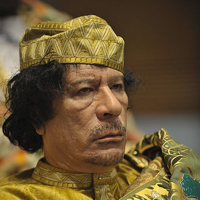Who is ready to talk to Moammar Gadhafi? Last week, President Hugo Chávez of Venezuela announced that his Libyan counterpart and longtime ally would accept an international "Committee of Peace" to end the rebellion that threatens to destroy him. Rebel leaders in Benghazi dismissed the proposal out of hand. Yet there is a good chance that outside mediators -- if not necessarily Chávez -- will eventually play a part in ending the Libyan civil war.
A negotiated end could in fact come quite soon if the rebels regain their early momentum and push on to Tripoli. Although Gadhafi says he is ready to fight to the death, he or his lieutenants might change their minds if defeat becomes imminent. For their part, the rebels might begrudgingly accept talks rather than risk the bloodbath that may accompany a major assault on Tripoli. International officials could be drafted to oversee the surrender, observe the disarming of Gadhafi's forces and take the colonel into exile or, better still, into custody.
If the conflict grinds to a stalemate, external mediators may face the far harder task of opening contacts between Gadhafi and his rivals in Benghazi, as both sides might be reticent to talk. With such a scenario offering no immediate solution to the crisis, there will doubtless be well-meaning calls for both sides to accept a power-sharing agreement similar to the one that former U.N. Secretary-General Kofi Annan devised to stabilize Kenya in 2008.

